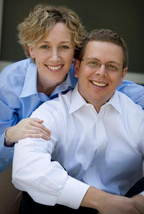Editor’s note: this is the latest in a series of stories about experimental ministries that typify the Presbyterian Church (U.S.A.)’s effort to establish 1,001 new worshiping communities in the next 10 years. ― Jerry L. Van Marter
Kairos Church, a ministry experiment of the Presbytery of Greater Atlanta, is located in downtown Atlanta. But it was born out of a small rural village in Japan.
Beth and Thomas Daniel, co-pastors of Kairos since it began in their living room in 2007, first met in that Japanese village when they were both part of a teaching program.
“I had not been inside a church for probably 10 to 12 years,” Thomas said. “But one of the other teachers … was getting baptized in a house church run by two Norwegian women and invited us both to come.”
It was his first time seeing an adult get baptized. “It was a wonderful experience,” he said, and started both he and now-wife Beth on the journey of marriage and ministry.
After the two returned from Japan, they were married and attended Columbia Theological Seminary in Decatur, Ga. Subsequently, while serving as a co-pastor in Illinois, Daniel was invited to preach at Peachtree Presbyterian Church in Atlanta.
“After the service I had lunch with some of the folks from Greater Atlanta Presbytery and they told me they had funding from a private source to start a new Presbyterian church,” he said.
The funding was from a family foundation and was born out of a concern about the lack of young adults in the Presbyterian Church (U.S.A.).
“They wanted to see if a Presbyterian church could get started and have the freedom to think creatively about itself and its mission without the laser light show and the multi-million dollar budget — could there be young adults who would get involved with that?”
The name, Kairos Church, came early on as part of that sense of call.
“Kairos is this idea of a God-given moment or opportunity. Unlike a lot of church planters, Beth and I didn’t have a five-year dream to do this — it felt like the Lord brought it about, a kairos moment rather than a long drawn out process,” Daniel said. “The name seemed to fit the crazy nature of what we were doing.”
Because the funding came from a foundation, Beth and Daniel had the freedom to stray from the playbook of standard new church development. So, in September 2007, the couple started meeting with seven others in their living room.
Six months later they moved out of the living room and into space given to them by First Presbyterian Church of Atlanta. A group of about 80 met in a classroom there until the presbytery invited them to move into an abandoned church building downtown, where they’ve been for the past two years.
“We normally have about 200-220 people on a given Sunday, and probably two thirds of them are under 40. While we are still very young by most church standards, we’ve actually gotten a bit older as we’ve grown,” Daniel said.
He attributed the church’s growth to its mission.
“I think that what is drawing people is that this is an encouraging place, not a rule-based, guilt-laden Christianity. We don’t spend a lot of time on who is outside the circle — we try to be welcoming and encouraging for all people. At the same time, it is clear that we are following Jesus. We are inclusive but unapologetically trying to follow Jesus.”
A lot of traditional churches make a mistake in assuming that younger people want a watered-down version of the gospel, Daniel said.
“When you look at Jesus, what he is calling us to is revolutionary. They are saying, ‘Don’t hold back — hit us with it,’” he said.
As Kairos studied aspects of the early church, what struck them was that it didn’t form an institution but instead gathered around values that shaped their lives. It’s important for churches to build on what they stand for rather than simply defining what they are not, Daniel said.
One of the images that Kairos Church has used to define who they are is that of an airport. “We are an airport, not the destination,” said Daniel. “Kairos itself is not the point.
“We lose our focus and create an idol of our churches so easily. But the reality is that Kairos might not be around in 50 years, or five years. It is wonderfully freeing but also wonderfully frightening because I want to be the point.”
It is not that the airport is not important — it is critically important in its ability to connect people with where they want to go.
In many ways Kairos reminds Daniel of that house church in rural Japan.
“I didn’t walk away from that house church talking about the church — I walked away talking about the message and the community. In many ways, Kairos has allowed me to get back to some of that.”
Erin Dunigan is a freelance writer, photographer, and pastor who lives in a small coastal community in Baja California, Mexico when she is not following her wanderlust out into the world.

